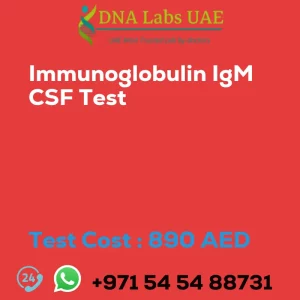GANGLIOSIDE ANTIBODY PROFILE IgM Test
Cost: AED 940.0
Overview
The Ganglioside Antibody Profile IgM test is a blood test that measures the levels of specific antibodies called IgM antibodies against gangliosides. Gangliosides are a type of glycolipid found on the surface of nerve cells. This test is primarily used to diagnose certain autoimmune disorders that affect the peripheral nerves, such as Guillain-Barre syndrome and Miller Fisher syndrome.
Components
- GM1
- GM2
- GM3
- GD1a
- GD1b
- GT1b
- GQ1b
Price
AED 940.0
Sample Condition
2 mL (1 mL min.) serum from 1 SST. Ship refrigerated or frozen.
Report Delivery
Sample Tue by 9 am; Report Same day
Method
Immunoblot
Test Type
Disorders of Nervous System
Doctor
Neurologist
Test Department
Pre Test Information
No special preparation required
Test Details
The Ganglioside Antibody Profile IgM test is a blood test that measures the levels of specific antibodies called IgM antibodies against gangliosides. Gangliosides are a type of glycolipid found on the surface of nerve cells. This test is primarily used to diagnose certain autoimmune disorders that affect the peripheral nerves, such as Guillain-Barre syndrome and Miller Fisher syndrome. These disorders occur when the body’s immune system mistakenly attacks the gangliosides, leading to inflammation and damage to the nerves.
The Ganglioside Antibody Profile IgM test helps to identify the specific gangliosides that are being targeted by the immune system. The test measures the levels of IgM antibodies against different types of gangliosides, including GM1, GD1a, GD1b, and GQ1b. Elevated levels of IgM antibodies against gangliosides may indicate an autoimmune neuropathy, while normal levels usually rule out these conditions. However, it’s important to note that a positive test result does not necessarily confirm the diagnosis, as other factors such as clinical symptoms and other test results are also taken into consideration.
The Ganglioside Antibody Profile IgM test is typically ordered by a healthcare provider if a person presents with symptoms suggestive of autoimmune neuropathy, such as muscle weakness, numbness or tingling in the limbs, difficulty walking, or problems with coordination. The test involves taking a blood sample from the patient, which is then sent to a laboratory for analysis. Results are usually available within a few days.
It’s important to discuss the test results with a healthcare provider, who can provide a proper interpretation and guide further diagnostic and treatment decisions.
| Test Name | GANGLIOSIDE ANTIBODY PROFILE IgM Test |
|---|---|
| Components | *GM1*GM2*GM3*GD1a*GD1b*GT1b *GQ1b |
| Price | 940.0 AED |
| Sample Condition | 2 mL (1 mL min.) serum from 1 SST. Ship refrigeratedor frozen. |
| Report Delivery | SampleTue by 9 am; Report Same day |
| Method | Immunoblot |
| Test type | Disorders of Nervous System |
| Doctor | Neurologist |
| Test Department: | |
| Pre Test Information | No special preparation required |
| Test Details |
The Ganglioside Antibody Profile IgM test is a blood test that measures the levels of specific antibodies called IgM antibodies against gangliosides. Gangliosides are a type of glycolipid found on the surface of nerve cells. This test is primarily used to diagnose certain autoimmune disorders that affect the peripheral nerves, such as Guillain-Barre syndrome and Miller Fisher syndrome. These disorders occur when the body’s immune system mistakenly attacks the gangliosides, leading to inflammation and damage to the nerves. The Ganglioside Antibody Profile IgM test helps to identify the specific gangliosides that are being targeted by the immune system. The test measures the levels of IgM antibodies against different types of gangliosides, including GM1, GD1a, GD1b, and GQ1b. Elevated levels of IgM antibodies against gangliosides may indicate an autoimmune neuropathy, while normal levels usually rule out these conditions. However, it’s important to note that a positive test result does not necessarily confirm the diagnosis, as other factors such as clinical symptoms and other test results are also taken into consideration. The Ganglioside Antibody Profile IgM test is typically ordered by a healthcare provider if a person presents with symptoms suggestive of autoimmune neuropathy, such as muscle weakness, numbness or tingling in the limbs, difficulty walking, or problems with coordination. The test involves taking a blood sample from the patient, which is then sent to a laboratory for analysis. Results are usually available within a few days. It’s important to discuss the test results with a healthcare provider, who can provide a proper interpretation and guide further diagnostic and treatment decisions. |








